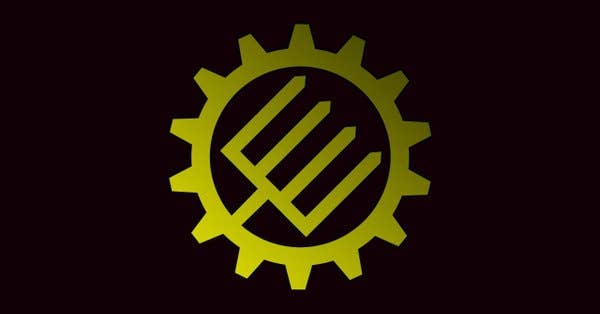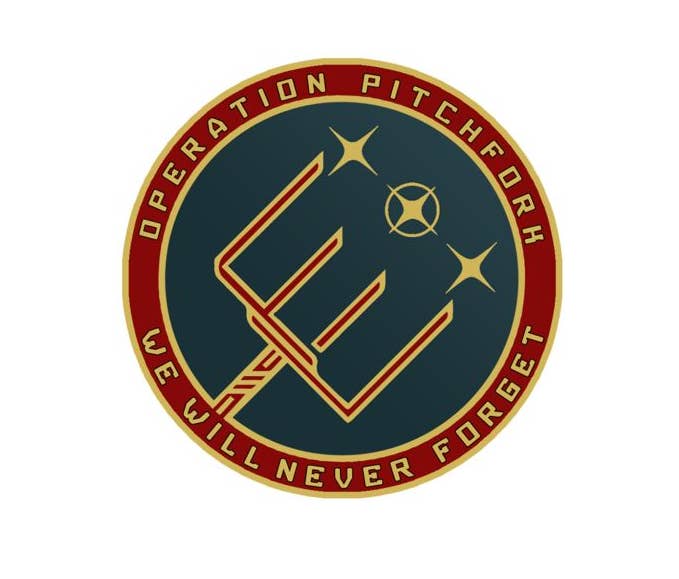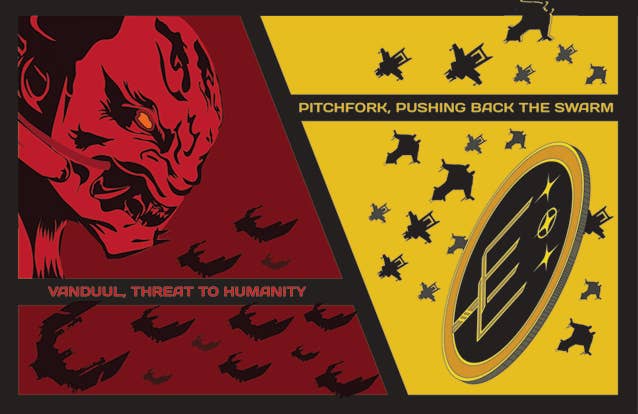What do you do when a hate group steals your logo?
How a Star Citizen player group responded to white nationalists adopting their branding, and what publishers could learn from Cloud Imperium's response
The ways in which fans engage with their favorite games has changed dramatically in the past decade, creating no shortage of odd situations and edge cases where the traditional approaches to handling problems don't really apply.
Cloud Imperium Games is dealing with one such situation right now, as the Star Citizen community group Operation Pitchfork uses a logo that bears more than a passing resemblance to that of the Traditionalist Worker Party, a white nationalist hate group as designated by the Southern Poverty Law Center. Both logos feature a four-pronged pitchfork head protruding up and to the right in the middle of a circular border.


The premise of Operation Pitchfork also complicated things. In the game's backstory, the Vanduul are a barbaric race of aliens that frequently raid human outposts for resources. Operation Pitchfork is intended to be the in-game equivalent of a peasant revolt, where human players turn the tables and invade Vanduul territory en masse with the equivalent of torches and pitchforks. Add in that Operation Pitchfork's promotional art occasionally included taglines like "Pushing back the swarm," and the parallels are distasteful, to say the least.
"Once you see it, you can't unsee it," one of Operation Pitchfork's coordinators, Mark Paalman, told GamesIndustry.biz about the logo similarities this week. That said, Paalman and his fellow Star Citizen fans have a pretty good defense for the similarity. Their group started in 2013, and has been using its version of the pitchfork logo almost as long. The Traditionalist Worker Party, on the other hand, didn't even exist until 2015.
Paalman said he didn't even find out about the similar logos until a couple months ago, when a woman was killed at the Unite the Right rally in Charlottesville, Virginia, and suddenly there was a lot more attention being paid to the variety of right-wing hate groups in the US.
"At first you feel like, what the hell is this? And then you get a bit angry," Paalman said. "It's not a direct copy, but it's very similar. So you start to think what can we do about this."
Paalman said he consulted with an expert in intellectual property law, but there were problems. For one, legal action would cost money. Venue was another issue, as Paalman is based in the Netherlands, while the artist who originally designed the logo is from Sweden, and the infringing group is in the US. Contacting the TWP to work out an extra-judicial solution also seemed problematic to Paalman.

"We do not want to be associated with them in any way," Paalman said. "And once we figured that a lawsuit would be pointless, we were like, do we want to expose ourselves to them and also get harassment out of it for our American members, especially? We said no."
The remaining options seemed to be ignoring the whole situation, or abandoning the logo and leaving it to the hate group that co-opted it in the first place. As if that wasn't galling enough, Operation Pitchfork members had already paid for banners, patches, and a storefront full of items bearing the logo, so a change would require writing those off as a loss as well. Nevertheless, Paalman said the group put it to a vote, and the logo will be changed.
"Any company working with and tacitly endorsing community groups would be well-advised to formalize those relationships"
As Operation Pitchfork is a fan initiative, it might seem like a stretch to lay any blame for its logo at the feet of Cloud Imperium Games. But as fan engagement has ramped up in recent years, organizations like Operation Pitchfork are increasingly taking on quasi-official status. Beyond giving the group a hub on the company's official website, Cloud Imperium has actually been selling an Operation Pitchfork skin for players to outfit their ships with. Fortunately, the skin doesn't feature the logo in question, but it should underscore that Cloud Imperium cannot convincingly divorce itself entirely from negative actions of its community groups while simultaneously endorsing and profiting off them.
As for Cloud Imperium's stance on the Operation Pitchfork logo, the company's director of communications David Swofford provided the following more than a month after we first inquired about the logo.
"It was several weeks ago that we started to look closer at this," Swofford said. "It did take us some time to contact members of the group. When we did, we let them know that there had been some concerns raised about how their logo might be misinterpreted as it had been pointed out that there were similarities to a logo utilized by a white nationalist group."
In this case, there was enough evidence to all but exonerate Operation Pitchfork of the worst accusations with a close look at the situation. But had it been something more along the lines of the Destiny 2 armor bearing a white nationalist symbol, Cloud Imperium would not have had a month to look into the situation. They would not have had weeks to get in contact with the group's leadership.
Any company working with and tacitly endorsing community groups would be well-advised to formalize those relationships. By all means, encourage them to express their enthusiasm for your game original ways. But the more you foster these efforts and profit directly from their existence (and selling official skins for them seems pretty direct), the more you'll be held answerable for their actions, and rightfully so. Even if you don't think these people represent you, they undeniably represent your game and its player base. It's in your interest to handle them accordingly.








